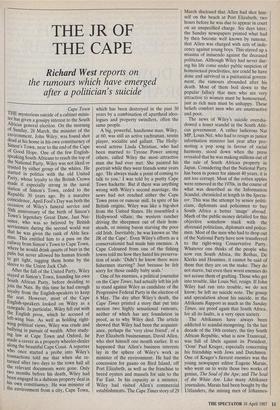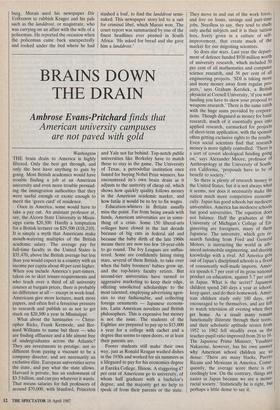THE JR OF THE CAPE
Richard West reports on
the rumours which have emerged after a politician's suicide
Cape Town THE mysterious suicide of a cabinet minis- ter has given a gossipy interest to the South African general election. On the morning of Sunday, 28 March, the minister of the environment, John Wiley, was found shot dead at his home in his own constituency of Simon's Town, near to the end of the Cape of Good Hope. One of the few English- speaking South Africans to reach the top of the National Party, Wiley was not liked or trusted by either group of the whites. He started in politics with the old United Party, whose loyalty to the British Crown made it especially strong in the naval station of Simon's Town, ceded to the Republic 30 years ago. By a macabre coincidence, April Fool's Day was both the occasion of Wiley's funeral service and 50th anniversary of the birth of Simon's Town's legendary Great Dane, Just Nui- sance, who was so beloved by British servicemen during the second world war that he was given the rank of Able Sea- man. This entitled him to a pass on the railway from Simon's Town to Cape Town, where he would drink quarts of beer in the pubs but never allowed his human friends to get tight, tugging them home by the sleeve to the Union Jack Club.
After the fall of the United Party, Wiley stayed at Sinion's Town, founding his own South African Party, before deciding to Join the Nats. By this time he had enough loyalty from the English-speakers to keep the seat. However, most of the Cape English-speakers looked on Wiley as a renegade. In particular, Wiley fell out with the English press, which he accused of left-wing bias. As well as holding right- wing political views, Wiley was crude and bullying in pursuit of wealth. After study- ing law at Cape Town and Oxford, he made a career as a property wheeler-dealer along the beautiful Cape Coast. A reporter who once started a probe into Wiley's transactions told me that when she re- turned after two days to the town hall all the relevant documents were gone. Only two months before his death, Wiley had been engaged in a dubious property deal in his own constituency. He was minister of the environment from a city, Cape Town, which has been destroyed in the past 30 years by a combination of apartheid ideo- logues and property swindlers, often the same people.
A big, powerful, handsome man, Wiley, at 60, was still an active yachtsman, tennis player, socialite and gallant. The Holly- wood actress Linda Christian, who had been married to Tyrone Power among others, called Wiley the most attractive man she had ever met. She painted his portrait while they were friends some years ago. 'He always made a point of coming to talk to you,' I was told by a pretty Cape Town hackette. But if there was anything wrong with Wiley's second marriage, the news had not reached either the Cape Town press or rumour mill. In spite of his British origins, Wiley was like a big-shot from the United States. He resembled a Hollywood villain; the western rancher driving the sheepmen out of their hom- steads, or mining baron starving the poor old Irish. Inevitably, he was known as `the JR of the Cape'. Even Wiley's efforts as a conservationist had made him enemies. A Cape Coloured from one of the fishing towns told me how they hated his preserva- tion of seals: 'Didn't he know there were fishermen starving? Just because he felt sorry for, those cuddly baby seals.' One of his enemies, a political journalist on the Cape Times, had actually left his job to stand against Wiley as candidate of the Progressive Federal Party in the election of 6 May. The day after Wiley's death, the Cape Times printed a story that put into motion two highly sensational rumours, neither of which has any foundation in proof, as to why Wiley died. The article showed that Wiley had been the acquaint- ance, perhaps the 'very close friend', of a Port Elizabeth businessman, David Allen, who shot himself one month earlier. It so happened that Allen's business interests lay in the sphere of Wiley's work as minister of the environment. He had the concession for guano on Bird Island, off Port Elizabeth, as well as the franchise to breed oysters and mussels for sale to the Far East. In his capacity as a minister, Wiley had visited Allen's commercial establishments. The Cape Times story of 29 March disclosed that Allen had shot him- self on the beach at Port Elizabeth, two hours before he was due to appear in court on an unspecified charge. Six days later, the Sunday newspapers printed what had by then become well known by rumour, that Allen was charged with acts of inde- cency against young boys. This stirred up a miasma of innuendo against the deceased politician. Although Wiley had never dur- ing his life come under public suspicion of homosexual proclivities, nor could he have done and survived in a puritanical govern- ment, the rumours abounded after his death. Most of them boil down to the popular fallacy that men who are very attractive to women must be homosexual, just as rich men must be unhappy. These beliefs comfort men who are unattractive and poor.
The news of Wiley's suicide oversha- dowed a lesser scandal in the South Afri- can government. A rather ludicrous Nat MP, Louis Nel, who had to resign as junior information minister last year after pro- moting a pop song in favour of racial harmony, stood down when the press revealed that he was making millions out of the sale of South African property in Japan. Considering that the National Party has been in power for almost 40 years, it is not too corrupt. Most of the rotten apples were removed in the 1970s, in the course of what was described as the Information Scandal, chronicled at length in the Specta- tor. This was the attempt by senior politi- cians, diplomats and policemen to buy South Africa a better `image' abroad. Much of the public money detailed for this objective somehow stuck with the aforesaid politicians, diplomats and police- men. Most of the men who had to drop out of the National Party have now transferred to the right-wing Conservative Party. Whatever one thinks of the people who now run South Africa, the Bothas, De Klerks and Heunises, it cannot be said of them that they are on the make. They do not starve, but even their worst enemies do not accuse them of grafting. Those who get into trouble, like Louis Nel, resign. If John Wiley had run into trouble, we do not know; he left no suicide note. The gossip and speculation about his suicide, in the Afrikaans Rapport as much as the Sunday Times, are proof again that South Africa, for all its faults, is a very open society.
The Afrikaners have always been addicted to scandal-mongering. In the last decade of the 19th century, the tiny South African Republic, what is now Transvaal, was full of libels against its President, `Oom' Paul Kruger, especially concerning his friendship with Jews and Dutchmen.
One of Kruger's fiercest enemies was the young newspaper editor Eugene Marais, who went on to write those two works of genius, The Soul of the Ape, and The Soul of the White Ant. Like many Afrikaner journalists, Marais had been bought by the Uitlanders, the mining men of Johannes- burg. Marais used his newspaper Die Volksstem to rubbish Kruger and his pals such as the landdrost, or magistrate, who was carrying on an affair with the wife of a policeman. He reported the occasion when the policeman came back unexpectedly and looked under the bed where he had stashed a loaf, to find the landdrost semi- naked. This newspaper story led to a suit for criminal libel, which Marais won. The court report was summarised by one of the finest headlines ever penned in South Africa: 'He asked for bread and she gave him a landdrost.'



















































 Previous page
Previous page